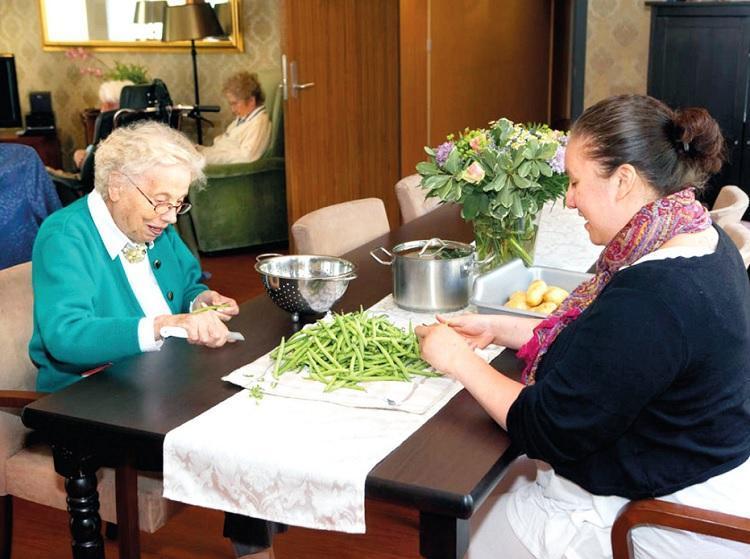Poster action for people with dementia: Op-ed
Peter Daalder

This file photo shows an elderly Dutch woman is taking part in an activity with a care taker in ‘dimentia village.’
The first sun of spring is shining. My mother is in the garden of her nursing villa. I haven’t seen her for a month now. Together with 18 older people with memory problems, she’s living in the house. Visiting her is forbidden, as it’s too dangerous. My mother, almost 91 years old, is vulnerable. But her dementia is not her only problem; like the other residents, she’s suffering from other medical problems like a weak heart, which is regulated by a pacmaker, and severe rheumatism in most of her fingers.
She doesn’t understand well what coronavirus is, but is complaining that she can’t leave the house and go to the hairdresser. And she wants to return home, to her parents. That has nothing to do with coronavirus; she always wants to go home – whatever that home is. Ultimately, nobody knows what’s going on in her mind. She likes walking, but she can’t find the way back home, so somebody always has to accompany her. And now that is forbidden, too, as the house is in complete lockdown. Talking to her in the garden, behind the fence, looks like talking to a prisoner. Luckily, she is not really aware of the situation.
Dutch figures
Every day around 2 p.m., the latest figures about coronavirus in the Netherlands are published. In a month, more than 2,500 people have passed away. There are also official figures about infected people, hospitalized people and, in particular, the number in intensive care. In reality, it’s the tip of the iceberg. That was the shocking truth that came out.
Last Wednesday, for the first time during this crisis, the government presented the figures of people who died outside hospitals – probably from coronavirus, but nobody knows for sure because they were not tested. It shocked everybody. Hundreds of people, mostly over 80, died in nursing houses. People living like my mother. She’s like many more mothers and fathers who are extremely prone to the virus, whereas children up to the age of 20 hardly have any problems at all. The mortality in that group is close to zero. Their grandparents and great-grandparents, however, are suffering and dying without their family around them.
Face masks
At my mother’s place, the care staff is now wearing face masks. In the Netherlands, there was a shortage of all protective material, like in almost every other country. The staff who are so close to residents who have issues with dementia were afraid their patients couldn’t understand their masks, glasses and gloves. They had to be closer than the recommended 1.5 meters because they assist their patients with eating, showering, brushing their hair and visiting the toilet.
It’s a heartbreaking, but most of the residents forget so quickly what they have seen that most people react quietly to this unusual situation. Another blessing of this period is that the atmosphere is very quiet. There are no visitors, as nobody can enter the house. It’s much better for the residents. All these normal daily impressions make their mind restless. My family often visits my mother, and we mostly take her out for a coffee, a short walk, a visit to one of her friends or relatives or just go out for a drive. She enjoys it most of the time, but it also makes her restless. Now, she enjoys the sun, glances at a magazine or a newspaper (there is no reading anymore) and admires the newly grown flowers. And she doesn’t really get all the commotion on television and in society about coronavirus. In the end, she forgets about that after just a minutes.
The Dutch Alzheimer Association has created a campaign over Easter. The slogan is ‘’wevergetenjullieniet.nl’’ (we will not forget you) printed on a yellow poster published in all Dutch newspapers with a forget-me-not. During Easter, it’s extra difficult for people if they can’t be with their loved ones and relatives, especially older parents. The idea is to hang the poster in a window to show people they’re thinking of them.
















